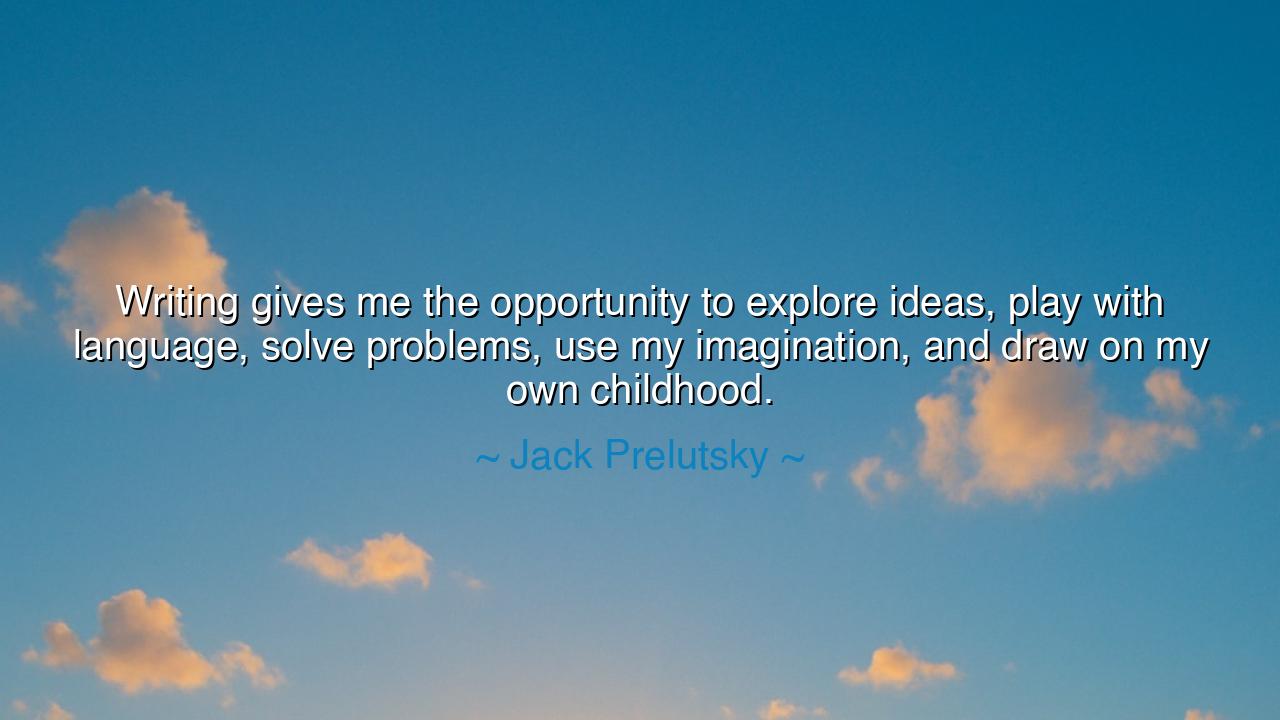
Writing gives me the opportunity to explore ideas, play with
Writing gives me the opportunity to explore ideas, play with language, solve problems, use my imagination, and draw on my own childhood.






When Jack Prelutsky declared, “Writing gives me the opportunity to explore ideas, play with language, solve problems, use my imagination, and draw on my own childhood,” he was not merely speaking as a poet, but as one who had glimpsed the sacred nature of creation itself. For writing, in its truest form, is not the act of placing words upon paper—it is the act of discovering the soul. It is the journey inward, where memory and imagination entwine, and the writer becomes both seeker and sage. Through his words, Prelutsky reveals that to write is to live twice—to walk once through the world, and again through the boundless landscape of thought and feeling.
He begins by speaking of the exploration of ideas, for writing is the voyage of the mind through the uncharted seas of possibility. Each idea, like a distant shore, calls the writer forward with promise and mystery. The ancients who carved their myths upon stone or sang their histories by fire knew this truth: that every story is a form of discovery. The writer is both mapmaker and traveler, tracing the contours of existence and charting the unseen paths of the human heart. When Prelutsky writes, he follows the same timeless impulse that moved Homer, Dante, and Shakespeare—to understand life through the act of expression.
Yet he also speaks of the play of language, for language itself is the divine instrument of creation. To play with it is not mere jest, but sacred art—the art of bringing life to sound and rhythm, of turning thought into song. Prelutsky, a poet for the young, found joy in words that danced, rhymed, and surprised. In this, he reminds us that the highest wisdom is often found in play, and that the child’s delight in language is the root of all poetry. The words of the wise must sing as well as speak, for truth that cannot be felt is truth half-lived.
In the third part of his quote, Prelutsky speaks of solving problems, and here he reveals writing’s quiet alchemy. The writer, when faced with chaos, turns to words to find order; when faced with confusion, seeks clarity through expression. Writing becomes both mirror and remedy. Consider the story of Anne Frank, whose diary, written in hiding, was more than a record of fear—it was a way to endure it. In giving voice to her thoughts, she shaped meaning from suffering, light from darkness. Thus writing becomes not escape, but confrontation—the sacred act of transforming pain into understanding.
But perhaps most profound is his mention of imagination, that radiant force which connects the human to the infinite. It is through imagination that the writer becomes a creator, crafting worlds that never were yet feel eternal. The imagination is the breath of the divine within us—it allows us to see beyond what is, to what might be. When Prelutsky uses his imagination, he joins a lineage stretching back to the storytellers of old who, gazing into the stars, gave birth to gods and heroes. To imagine is to participate in creation itself.
And then, at last, he speaks of drawing upon his childhood—for in the eyes of the child lies the purest vision of wonder. The child’s heart sees without cynicism, feels without armor, and dreams without limit. Prelutsky reminds us that the writer must never lose that innocence, for it is the wellspring of creativity. Many of the world’s greatest artists have sought to return to that childlike state. Pablo Picasso once said, “It took me four years to paint like Raphael, but a lifetime to paint like a child.” To remember one’s childhood is not nostalgia—it is an awakening to the part of us that still believes in miracles.
Thus, in this one reflection, Prelutsky unveils the full circle of the writer’s calling: to think deeply, to play joyfully, to solve, to imagine, to remember. Writing, he shows us, is not an act apart from life—it is life distilled, clarified, and reborn in language. It is both a discipline and a joy, both intellect and heart, both craft and communion with the eternal.
So take this wisdom as your own, dear reader: write not only to be understood, but to understand yourself. Explore your ideas courageously. Play with your words as a musician plays with melody. Let your imagination roam through the infinite night, and never lose the child within you who wonders and dreams. For writing, as Prelutsky teaches, is not only an art—it is the sacred act of becoming more fully human. And once you have written your truth, the world will never again be quite the same, for your imagination will have left its eternal mark upon it.






AAdministratorAdministrator
Welcome, honored guests. Please leave a comment, we will respond soon